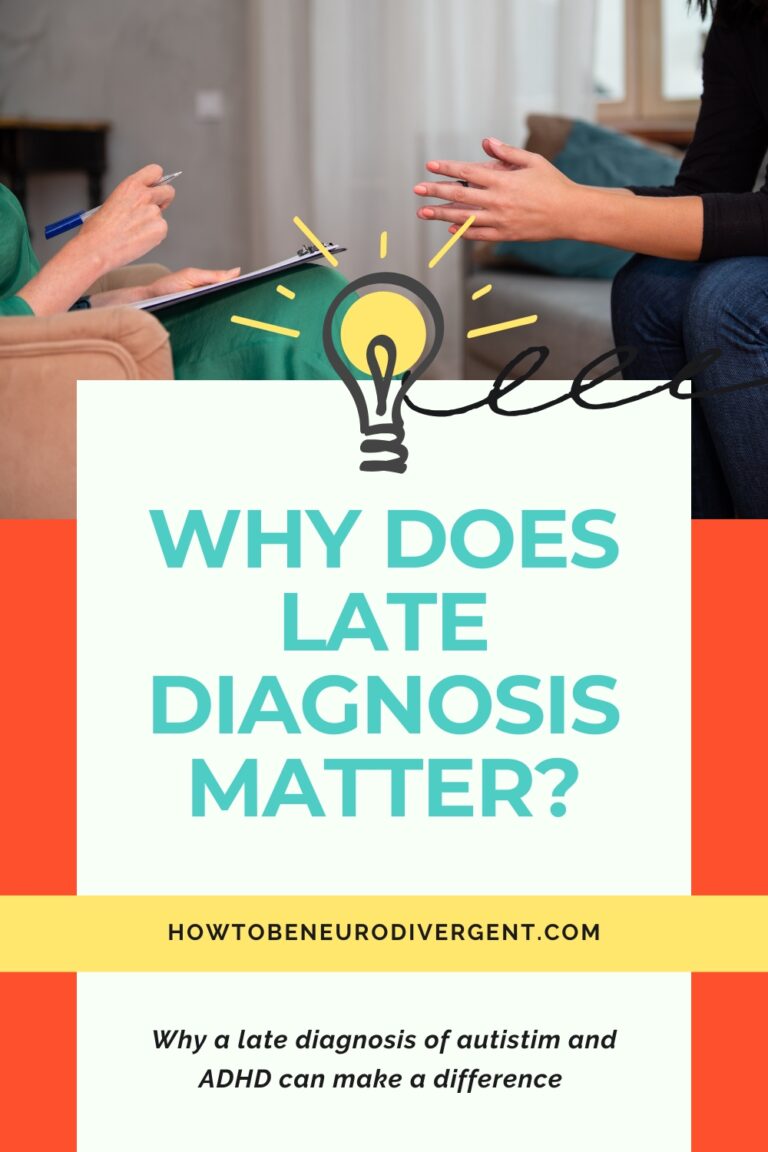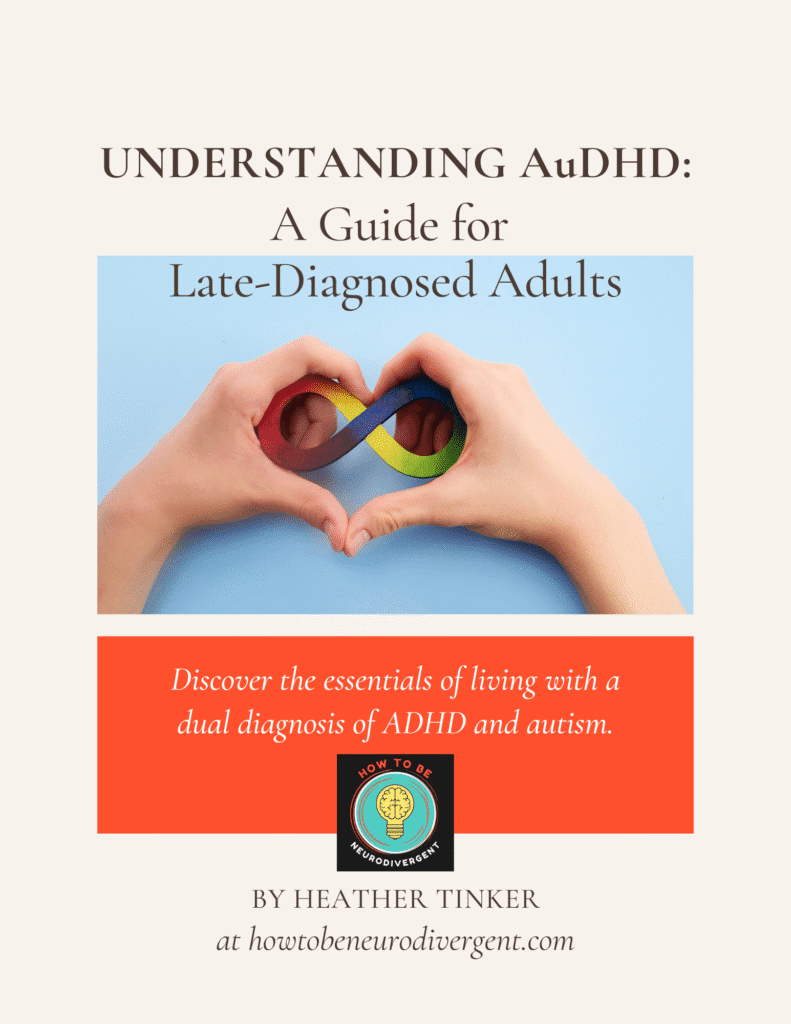Table of Contents
ToggleJust Get it Together
Late diagnosis of ADHD and autism matters. For years, I thought I just needed to try harder.
To stay more organized. To be less sensitive. To finally “get it together.” Change my planning & scheduling system. Stick to that exercise routine. Maybe if I ate more of this or less of that? Added in super foods? I could be more consistent. I could have more energy. I could reach my goals. Journaling! That would help me clear my head. Every year, I knew this was the year. If I just “put myself out there” more, I would find my people. Make more friends.
This couldn’t be it. This couldn’t be all there was. Constantly fighting against a heavy cloud of gloom, swirling thoughts, a memory like Swiss cheese for the important things and like a steel trap for the most random facts. Paralyzing exhaustion, social confusion and isolation. Never feeling like “enough.”
I had a body that had been buzzing with so much anxiety and tension for so long that I didn’t even realize I was experiencing anxiety or sensory overwhelm. I always felt like this. Why couldn’t I just relax? Be in the moment? I felt like my life was passing me by and I was missing it all. But I was powerless to stop it.
Why Did You Let it Go This Far?
Doctors said my labs were fine. No concerns. Maybe I should lose a little weight. Take this low dose anti-depressant…
I knew I was smart. I knew I was capable. Why did everything feel like such an uphill battle? Did other women really fly through life with the ease they portrayed? Or were they putting on a brave face, like me? I talked to other women. Yeah, motherhood is hard. They were tired and overwhelmed.
I came to the conclusion that we were all “in the same boat.” Everyone said marriage and motherhood was difficult. So…I needed to put in more effort, I guess? Regroup. Rally again.
When I was finally diagnosed as AuDHD — both autistic and ADHD — in adulthood, everything I thought I knew about myself shifted. I was struggling significantly in ways that others weren’t (that one was like a punch to the gut). Now I had a way to understand why things had always felt that way. Why the world often seemed louder, faster, and more confusing than it did for everyone else.
A late diagnosis doesn’t change your past, but it changes how you see it.
And that understanding matters more than most people realize.
What "Late Diagnosis" Really Means
For many adults, ADHD and autism went unnoticed for decades.
We were the “quiet” kids, the dreamers, the perfectionists, or the ones who worked twice as hard to appear “fine.” Got good grades. Stayed out of trouble.
We masked, often without realizing it, by copying social patterns, overcompensating for executive dysfunction, or forcing ourselves to fit in at the cost of our own energy and authenticity. We acted like everything was fine because it’s all we knew. And there was no other option, really. People didn’t “get it.” Everyone has struggles. This is just life. Maybe we were weak or overreacting.
On the surface, we had everything going for us. But behind closed doors, we collapsed with exhaustion, were overwhelmed with intense emotions, and longed for deeper connection and understanding. We dragged ourselves along with such intense effort, clawed ourselves out of bed one day after the other.
Professional Knowledge
Because the diagnostic criteria were written around young boys with obvious externalized traits, stereotypes, and outdated assumptions, so many of us slipped through the cracks.
The professional knowledge just wasn’t there. The idea of “high-masking” autism was put forth in the early 1980s by Lorna Wing as a way to explain why females were underdiagnosed. But it wasn’t seriously studied or recognized until the 2010s. We know now that people with ADHD can also be high-masking and that being high-masking is not exclusive to females.
It also wasn’t until 2013 that a person could be diagnosed with both ADHD and Autism. So even if someone had managed to be diagnosed under one category, they may have been missing half of the picture.
A late diagnosis isn’t about finding a new identity. We’re not trying to get attention with a label. We’re not trying to avoid accountability and make excuses. It’s about finally having language for an experience we’ve lived our whole lives. It’s about pausing to take a breath after gasping for so long. Admitting the ways in which we struggle after putting up a front for so long is often not an easy thing.
Not only can we more clearly see the struggles we’ve been having, but we can also find more clearly defined solutions. Neurotypical advice for improving our quality of life could only go so far without knowing how to adapt it to our neurodivergence. And that is why a feeling of “personal failing” is so pervasive among this population.
Why it Matters
Late diagnosis of ADHD and autism matters. When you spend years believing your struggles are personal failures, it shapes everything. It shapes your confidence, relationships, work, and even your sense of self. This can lead to poor mental health and
That’s why understanding your neurotype can be life-changing.
It allows you to:
- Release shame. You weren’t lazy, flaky, or dramatic. Your brain was working differently all along. There were real neurobiological reasons for your differences and your whole-body exhaustion.
- Find self-compassion. You start to see patterns instead of “problems.”
- Build strategies that actually work. No more forcing neurotypical systems that never fit.
- Reconnect with your strengths. Creativity, deep empathy, unique insights. These are part of your wiring, too.
It’s not too late to build a life that fits your brain.
It’s just the first time you’ve been given permission to.
The Emotional Side of Late Diagnosis
Many of us describe the process as both a relief and a grief.
Relief to finally understand, and grief for all the years spent struggling and misunderstood. And, if we’re being honest, maybe a little grief over losing the future we had planned for ourselves. Because now we see that many necessary changes need to be made, and a new future envisioned. One that supports our neurotype.
You might look back at your childhood and see moments of isolation or burnout with new clarity. You might also feel anger at systems that missed you. Even if the science wasn’t there at the time. Maybe someone could have listened. Taken you seriously.
All of that is valid.
Healing from a lifetime of masking takes time.
But with understanding comes gentleness. And gentleness is where healing begins.
It’s a lot to process. A lot to learn. It’s a daunting task to reframe your entire past and your entire future through a new lens. But it can also be a liberating experience full of hope for the future you have ahead of you.
Moving Forward With Understanding
Getting a late diagnosis isn’t the end of the story; it’s the beginning of finally coming home to yourself.
You don’t have to have it all figured out right now.
Start small. Learn about your traits. Notice what brings regulation or dysregulation. Give yourself permission to unmask slowly and safely.
If you’re in the early stages of exploring this — wondering what AuDHD even means, how traits overlap, or where to start — I made something to help: It’s a simple, supportive guide to help you understand both ADHD and autism together, and begin building a life that fits your brain — not the other way around.
You're Not Late. You're Right on Time.
Late diagnosis of ADHD and autism matters. It doesn’t make your story any less valid.
It means you’ve finally been handed the missing map. Now you get to move forward with understanding, self-trust, and hope.
You were never broken.
You were always neurodivergent.
And now, you finally have words for it.
If you enjoyed this post, you might also like 👉Discovered Late: Processing My Late-Identified Autism.
Thanks for listening, friends.
Disclaimer:
This post reflects my personal experiences and perspectives as a late-identified neurodivergent adult. While I aim to share helpful insights, I don’t speak on behalf of the entire ADHD or autistic community. Neurodivergence is diverse and individual—please interpret this content through the lens of your own needs and experiences. This article is not a substitute for professional or medical advice.






